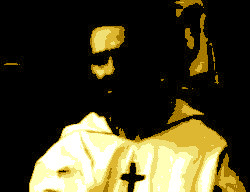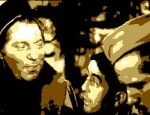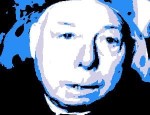Film Review
Léon Poirier's portrait of the French Sahara missionary Charles
de Foucauld is a sombre and brooding affair that is perhaps too
respectful of its subject to provide any deep insights into his
inordinately complex and elusive personality. The life of de
Foucauld can be summarised in a sentence - having failed as a French
officer in his youth because of his wayward temperament, he had a
regious conversion in his mid-twenties and thereafter led a saintly
hermit-like existence in the Sahara before being shot dead by armed
bandits. The film adds very little flesh to this skeleton
narrative, and as a result it struggles to fill its feature-length
runtime, although there are a few powerful moments along the way.
If Poirier is remembered at all today, it is most likely for his
remarkable documentary
Verdun: visions d'histoire (1928),
one of cinema's starkest and most informative accounts of the First
World War.
L'Appel du silence likewise
has some striking visuals, in particular the location sequences set in
the Sahara Desert, which have a haunting beauty of the kind that might
well take a man prisoner all his life, as in fact happened to de
Foucauld. It was in the sandy wasteland of the Sahara that
Charles de Foucauld felt closest to his God and it is in its evocation
of the missionary's unbreakable ties to the desert that the film is
most successful.
Here, de Foucauld is portrayed humanely, but with not much in the way
of depth, by the charismatic Rumanian-born actor Jean Yonnel, who was
often cast in exotic roles, in such films as Fyodor Otsep's
Amok
(1934) and Jean Dreville's
Les Nuits
blanches de Saint-Pétersbourg (1938). Yonnel's
inexpressive performance preserves the mystique of the character he
portrays, somewhat to the detriment of the film if you are expecting a
deeper insight into de Foucauld's character. Even for those who
not religiously minded,
L'Appel du
silence is a strangely beguiling film - by no means a
masterpiece, but an effective expression of a man's religious awakening
and spiritual fulfilment through faith. This was one of the
first films to receive the Grand prix du cinéma français (in 1936),
a forerunner of the Césars.
© James Travers 2015
The above content is owned by frenchfilms.org and must not be copied.
Film Synopsis
In his early twenties, Charles de Foucauld brings disgrace upon himself
when, as an officer in the French Army, he insists on taking a woman to
live with him whilst he is posted in North Africa. On his return
to France in 1886, de Foucauld experiences a strong religious awakening
which drives him towards a solitary life of prayer and
contemplation. After being ordained at the age of 43, he returns
to the Sahara and lives almost as a hermit before he chooses to join
the Tuareg, a nomadic desert people in the south of Algeria. For
the next ten years, de Foucauld forges a close bond with the Tuareg,
but his life ends abruptly and tragically when, in 1916, armed rebels
drag him from his fort and shoot him dead.
© James Travers
The above content is owned by frenchfilms.org and must not be copied.



